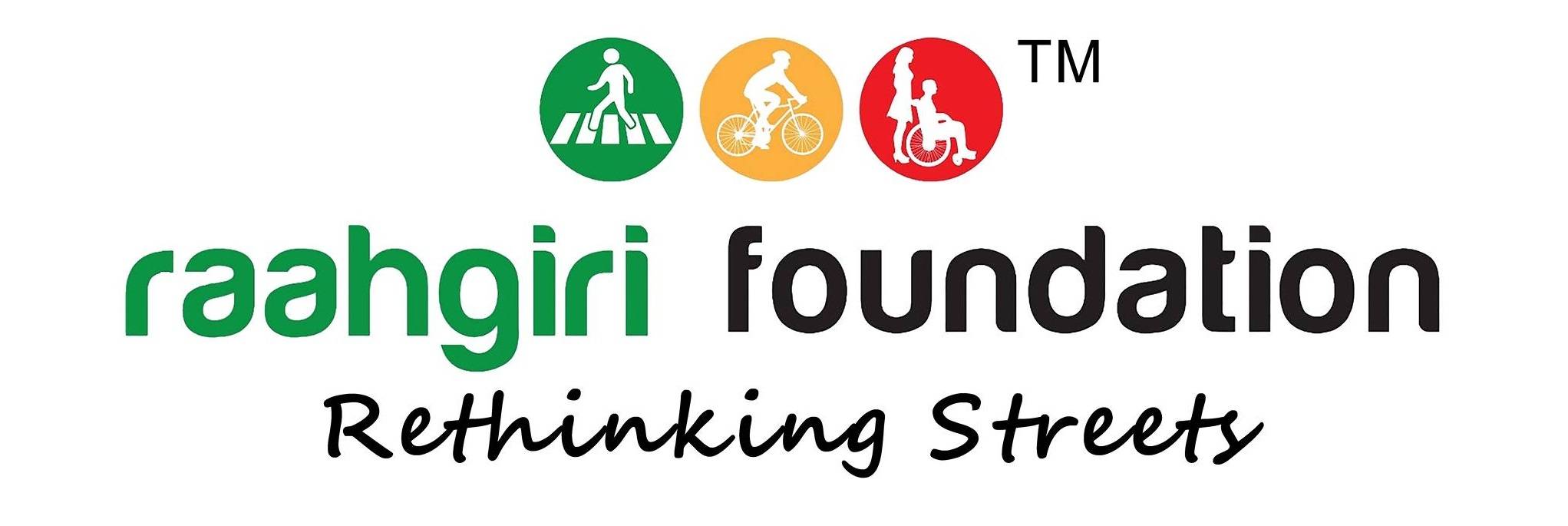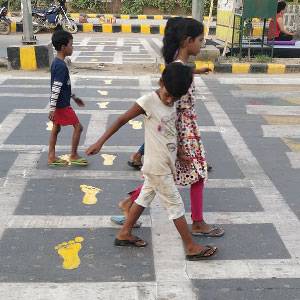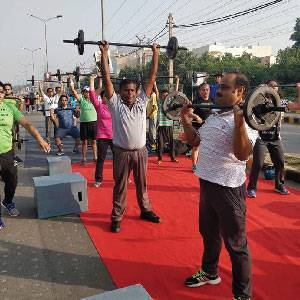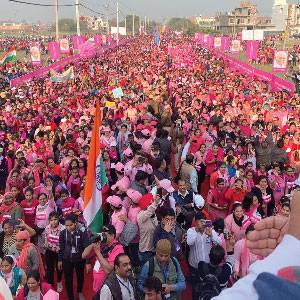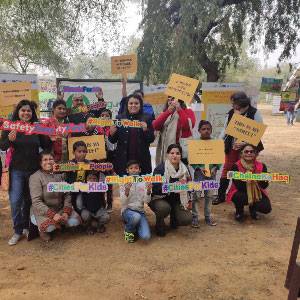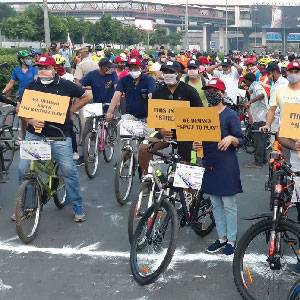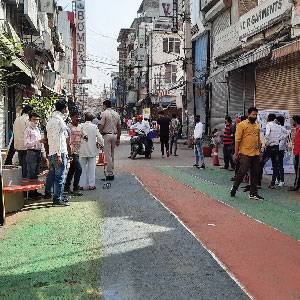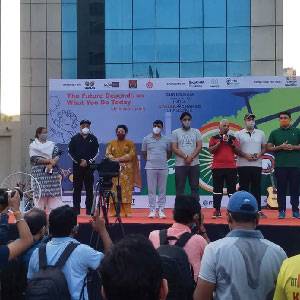Our Initiatives
No More Traffic Deaths
Be Street Smart
Join our ‘Be Street Smart’ campaign and take a stand for responsible street usage. Being street smart means being committed to safety and being aware of your role as a street user. It means disposing of trash properly, making safe choices, and reporting hazards. It’s not just about having the skills to navigate the streets, but also about taking responsibility for making our streets better and safer for everyone.
Street smartness is about being aware of the impact our actions have on the community, and making an effort to reduce negative effects. It’s about considering the needs of all street users, from pedestrians to drivers, and making sure that everyone can move around safely.
As part of our campaign, we’ll be working to raise awareness about the importance of being street smart among the youth. We believe that by educating and empowering the next generation, we can make our streets more accessible for all.
Starting today, our campaign will run for over 6 months, and we’ll be using a variety of methods to spread the word, such as social media, billboards, and community events. We’ll also be encouraging people to take the pledge to be street smart and make a personal commitment to safety.
Join us in making a difference, and help make our streets safer for everyone. Take the pledge today and #BeStreetSmart. Visit our website to learn more and take the pledge: https://bestreetsmart.raahgirifoundation.org
Rethinking Streets
Raahgiri Days
Raahgiri Day is India’s first sustained car-free citizen initiative that promotes safety of pedestrians and cyclists, healthy living, connects communities by reclaiming city streets and public spaces, to eventually reclaim urban lives. It has spread over 70 cities across 18 states with a collective footfall of over 13 million since November 2013. With more than 2,626 events till now (March 2020), RF has developed various Raahgiri modules that influence and engage people at city and neighbourhood levels. Modelled after an event called ‘Ciclovia’ in Bogota, Colombia, Raahgiri Day is organized by cordoning off a stretch of a road for few hours a day every week, where vehicular movement is entirely prohibited. The street is then opened for the citizens promoting public health, well-being, fitness, togetherness and joy. The idea itself is reflected in the name “Raahgiri” where suffix ‘giri’ promotes the act as a movement to reclaim ‘raah’ which is hindi word for path or road for pedestrians. People reclaim their streets with range of activities such as walking, running, cycling, skating, street games, street art, dancing, performing arts, yoga, aerobics and Zumba during the hour.
No More Traffic Deaths
Gurugram Vision Zero
To bring down road fatalities and accidents in the city of Gurugram, the District Administration, in collaboration with Raahgiri Foundation and Nagarro will start a ‘Gurugram Vision Zero’ which was inaugurated in March of 2022.
The partnership envisions to reduce road traffic deaths through improvements in road engineering, education campaigns and enforcement. This will be done by adopting a scientific approach to identifying blackspots in the district, conducting road safety inspections, re-engineering roads, innovating traffic management techniques, scientific crash investigation, tactical urbanism, education programmes in school and colleges and capacitating city engineers, police and community.
City governments in India, typically do not involve the end user when making decisions on the provision of roads or transport. Raahgiri Foundation seeks to pioneer a collaborative model where all stakeholders communicate with one another in order to develop solutions that are beneficial for all. The stakeholders in this model would include officials of the various engineering departments, police, industry experts like architects, urban designers, contractors and most importantly the community.
GVZ will, and is, going to operate in a similar manner to the Haryana Vision Zero (HVZ) programme, albeit on a district-level instead of across the state.
No More Traffic Deaths
Punjab Vision Zero
Instating Punjab Vision Zero (PVZ), RF has briefly worked with the state government of Punjab to produce a report on achieving Punjab’s vision for no traffic deaths aiming to achieve zero road crash across the state, following the model of HVZ.
No More Traffic Deaths
Street Redesign
RF has also undertaken to push actual changes in infrastructure into the physical urban fabric. It has played a pivotal role in reimagining an orphan industrial road leading to Sarhaul Village in Gurugram and has undertaken redesign of five other roads around Gurugram. The emphasis is on executing pedestrian-friendly streets by encouraging sustainable infrastructure for non-motorised commute types.
Firstly, ‘Anath road’(or Sub. Major Luxmi Chand road) located in Udyog Vihaar has been proposed to be redesigned to the city authorities of Gurugram, Haryana. The design demonstrates a public friendly infrastructure eliminating the issues of unsafe access, encroachments, surface parking, poor drainage and lack of pedestrian amenities. Besides, special attention has been given to designing to save all existing trees on the road.
Secondly, five model roads across Gurugram, Haryana have been identified and conceptual framework is being prepared. The road are Mount Olympus School Road, South City – 1 Road, Chouma Road, Sushant Lok Road and Sadar Bazar Road. The road leading to Mt. Olympus School in sector 47 has been presented to MCG(Municipal Corporation Gurugram) to achieve a ‘school zone’ and others to facilitate ‘complete streets’, in different zone types. The projects will address road safety issues and will act as a standard or benchmark for other roads in the city.
No More Traffic Deaths
Haryana Vision Zero
In 2017, Haryana accounted for 3.3% of total road traffic deaths in India. To curb the road deaths and injuries, Haryana Chief Minister Manohar Lal Khattar launched Haryana Vision Zero on 2nd May 2017. The model aims to achieve zero road deaths in Haryana by scrutinizing and eliminating technical flaws on roads.
Haryana became the first state in India to officially adopt the Vision Zero approach. The Vision Zero approach has been adopted in several parts of the developed world to reduce the number of traffic fatalities to zero by focusing on building forgiving infrastructure and safer roads through a coordinated strategy with all stakeholders involved. This program has been successfully advancing towards its vision to minimize traffic fatalities all over the state through the #SafetyFirst approach. The program comprised of four key areas of work – engineering, enforcement, education and emergency care. It brought into focus the components of engineering and enforcement to piece together the overall road safety strategy.
Since 2017, over 6500 km of Highways, rural and urban roads were audited, of which 2400 km have been rectified. Police FIRs for 4 years starting January 2016 to December 2019 were analysed through which 488 Blackspots were identified for the duration 2016-18, of which 185 have been rectified. By March 2020, 150+ blackspots had been identified based on 2017-19 FIRs. 1300+ crashes had also been Investigated. The biggest impact of the project so far has been saving the lives of over 400 people and over 1000 persons avoiding grievous injuries due to the reduced number of crashes in the state (estimated). Further, the estimated savings to the state GDP is over Rs. 600 crores, and about 900% return on investments.
No More Traffic Deaths
Workshops & Walk_shops
The organisation has conducted several workshops and walk-shops to capacitate city officials as well sensitize key stakeholders including young children and senior citizens.
We have also hosted and taken part in several capacity-building workshops with other partner organisations such as WRI India as well as with government agencies such as the Gurugram Metropolitan Development Authority.
Capacity building enables social organizations and their leaders to develop competencies and skills that can make them more effective and sustainable as well as an opportunity for different organisations to share their knowledge thus increasing the potential for them to enrich lives and solve society’s most intractable problems, in this case, road safety.
Police and engineer training workshops and discussion panels are arranged in collaboration with expert groups and individuals that help participants understand holistic approach to road safety. This not only sensitizes them towards the existing challenges but also provides them with a time slot where they can together innovate solutions and recreate systems.
Walk_shops are hands on workshops to help city stakeholders brainstorm together on issues around common public streets. School students, parents, teachers, RWA (Resident Welfare Association) members, citizen groups, volunteers and city officials come together to experience the conditions of public infrastructure on foot. This is followed by engaging exercises of documenting, analysing and solution-finding for people friendly infrastructure on neighbourhood level.
No More Traffic Deaths
Campaigns
RF continuously collaborates with other organisation to campaign for safer, healthier and sustainable cities of future. Clean air has been a primary theme of creating awareness stressing upon planning of urban transport, green biodiversity and conserving existing natural asset. Other themes advocated in various Raahgiri Day have been breast cancer awareness, children’s mental health, neighbourhood cleanliness, child abuse prevention, marine life conservation, women empowerment and awareness about ocean plastic. These are over and above the intrinsic themes to promote road safety, inclusive streets and sustainable development goals.
Raahgiri has campaigned and supported #StreetsForAll, #RightToWalk, #LightUpHerLife, #StepOutAtNight, #RunForYouth, #EachForEqual, #AgainstAirPollution etc.
ALL CONTACTS
- C-157, Anand Vihar, Vikas Marg Extension, Delhi, India, 11009
- Office +91-8826865797
- raahgirifoundation@gmail.com
- Copyright All Rights Reserved : Raahgiri Foundation
- raahgirifoundation@gmail.com
